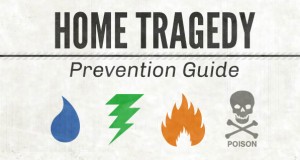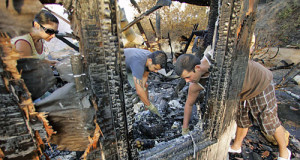Now that I'm a grandmother looking back on my fire service career, I feel as if I have something to share that I believe will help other public safety leaders to never lose faith in people and their organization. This is the best job in the world and my enthusiasm 36 years later is stronger than ever! I'm going to speak from the heart because I've always been a compassionate person who loves people.
Read More »Tag Archives: fire department management
A New Stop Fires Paradigm
Why do we keep building homes and installing appliances and furnishings that don't keep fires from starting and spreading? A new stop fires paradigm is needed to eliminate preventable fires in the USA. We've made safer cars for years, why not safer homes?
Read More »Wildfire Lessons from the Past Not Learned
Wildfire experts are telling us that fires are burning hotter and faster and being feed by fuels—trees and vegetation—that in most western states have been ravaged by drought and insect infestation. Yet people still build in the WUI, fail to take appropriate measures when building their homes and maintaining their property and then expect firefighters to come to the rescue when wildfires strike
Read More »Fire Service Legend Pens 1st Book
Dr. Clark’s book is a compilation—an anthology if you will—of his writings on the above topics over the course of the last 40 years. If you’ve missed the opportunity to “tap into” the brilliance of one the premiere fire service leaders of the past several decades, Dr. Clark’s book is a great way to get your “homework” done, albeit a little late.
Read More »Fire Prevention and Suppression: The Fire Service’s Identity Crisis
Driving a car once was an extremely dangerous activity for the average person (and it still is for people that don’t give it their full attention). In the United States, we’ve made significant reductions in the mortality and morbidity statistics associated with motor vehicle crashes and we’ve done it through education, engineering, and enforcement. We’re far past the time when we need to put more of our energies and efforts into those “3-E’s”—way more!—when it comes to eliminating preventable fires in our communities.
Read More »Be Proactive: Marketing Fire and EMS
The reality that's "hitting" home with many Fire & EMS organizations today, however, is that their citizens do have a choice. In the current economic climate, where most local governments are having to make tough fiscal decisions, elected officials and their constituents are making "buy" or "no buy" decisions regarding the public safety services for their community. Don't believe it? Look at how many cities, towns, and counties are laying off personnel, closing fire stations, cutting back on non-emergency services, etc.
Read More »Why did you want to become a Firefighter?
That question has been around for generations, no? As leaders in Fire and EMS organizations, do we truly know the answer for ourselves and others in our organizations? If we are to continue to recruit and training and retain the individuals necessary to adequately staff our organizations in the coming years, perhaps we would be better served to ponder the question.
Read More »USA Fire Service Safety Culture: Another Perspective
In the USA you certainly have a very militaristic and I would say macho culture in your fire service. This is compounded by the public perception of fire fighters and the pedestal they put them on. (Don't get me wrong as a former fire fighter I hold all fire fighters in high esteem, but they need to realise [sic] they are not super human).
Read More »Stop Romanticizing Firefighting!
Until we stop romanticizing the job of a firefighter with “how it used to be”, we will never get the current and future generations of firefighters to understand—really understand and take it to heart—that when you look at the facts, the vast majority of risks in the business of firefighting should have gone the way of the dodo bird.
Read More »Approachability—A Key Officer Characteristic
Approachability is a key leadership characteristic, but one that few leaders actively work to develop. Learn more about how to become more approachable as a Fire and EMS officer, or for that matter, anyone who leads, guides and directs people in accomplishing a mission.
Read More » Fire & EMS Leader Pro The job of old firefighters is to teach young firefighters how to become old firefighters!
Fire & EMS Leader Pro The job of old firefighters is to teach young firefighters how to become old firefighters!









